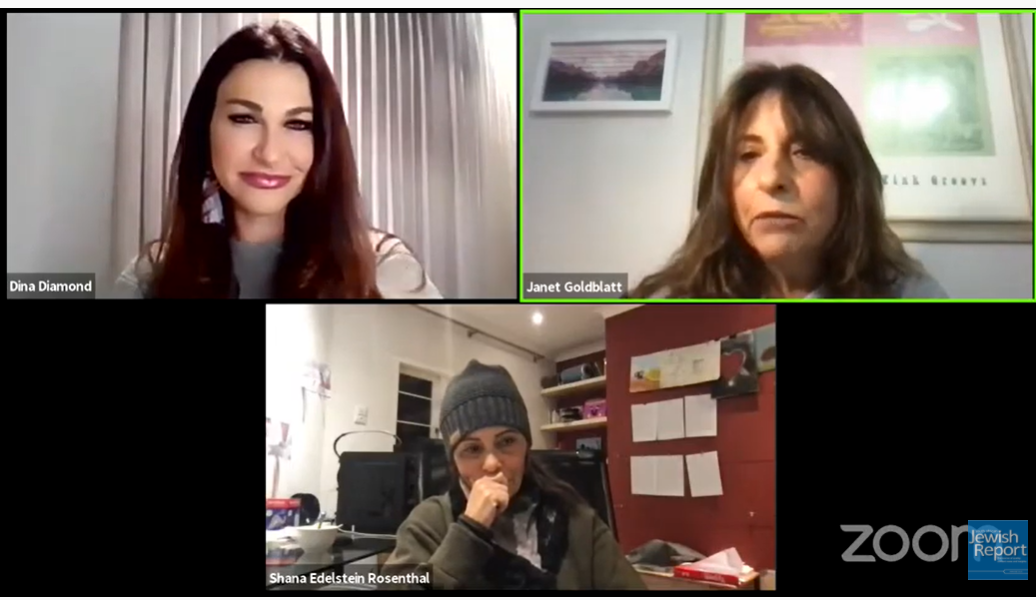
Community

Melville Edelstein murdered by outsiders, say former Soweto pupils
He was senselessly killed during the Soweto uprising of 1976, in the wrong place at the wrong time because of his dedication to the disenfranchised. And yet, while many know the name Dr Melville Edelstein, few know what he stood for and what really happened to him on that day.
Now, a SA Jewish Report webinar has shed new light on his final moments for his own children, and offered an opportunity to build his legacy.
During the webinar, former pupils of the Morris Isaacson High School who were involved in the uprising told Shana Edelstein Rosenthal and Janet Goldblatt (Edelstein’s two daughters) that it wasn’t possible that school students killed their father, saying it was done by others who didn’t know him.
“We always thought it was the students who killed him. But the people on the webinar said it may have been others – people who didn’t know my dad,” says Goldblatt. “That lines up with what famed press photographer Peter Magubane said – if they had known it was Dr Edelstein, they never would have killed him. He was part of the community.” Magubane found Edelstein’s body.
Omry Makgoale, who was in matric at Morris Isaacson in 1976, told the Edelstein women on the webinar, “It was probably unemployed youth [who killed him]. The students of Morris Isaacson knew him and would have protected him. We had white teachers at the school, and we protected them. The people who killed him were aware that we [the students] weren’t there and we were already in Orlando West.”
“From Morris Isaacson High School to Orlando West is a distance of 7km to 8km. So, most of the Morris Isaacson students were 7km or 8km away,” said Phale Modise, who was in Grade 11 at the school in that year.
Reflecting on what they heard on the night of the webinar, Goldblatt said, “We were gobsmacked. We had never heard that story before.” It was especially relevant because Edelstein died near the school. In addition, the school was seen as the “crucible” of the uprising. It was named for Morris Isaacson, a Jewish immigrant from Lithuania who set up a fund for black students to complete their education to university level. He also donated enough money to build a school with 10 classrooms. It opened in 1956 with 300 pupils.
Edelstein was a sociologist and respected academic who devoted himself to social-welfare projects in Soweto for 18 years. He instituted many projects to assist the youth, disabled, poor, unemployed, and marginalised.
Earlier on that fateful morning, he greeted students as they passed his office on Mputhi Street. He was hosting the official opening of a branch of his sheltered workshop programme in Orlando East, designed to provide employment for the disabled.
When news of the student protest reached the project, the ceremony was brought to an end. Concerned about the safety of a female colleague, Edelstein drove through crowds of students to get to his office. He rushed through the offices, instructing staff to leave immediately.
By the time he emerged later that morning, the political temperature was high after deadly police shootings. In the heat of the moment following the shock of the killing of schoolchildren by the police, he was stoned to death.
“It has always troubled us as Morris Isaacson students that because of our school’s proximity to where Dr Edelstein was killed, people spoke of his death as if the school children at Morris Isaacson were complicit. That’s understandable given the proximity,” said Modise.
Modise and others on the webinar didn’t know Edelstein personally, but they knew who he was at the time, saw him at work, and were impressed with his quiet dedication to the people.
“It was subsequent to the shootings in Orlando West, as anger spilled around Soweto, that Dr Edelstein became a victim. Black youngsters who would have been in that office were unemployed youth seeking to prove to authorities they were looking for work. Tsotsi elements also took advantage of the disorder.” He also noted that all of those arrested for the murder wore soccer shirts with the number 15 indicating that they were possibly part of a group or gang.
“I felt I should share those thoughts directly with them [Edelstein’s daughters],” Modise says. “I was touched meeting his direct blood relatives for the first time and hearing about them as victims also of that fateful day, sharing their loss.”
Goldblatt was 12 years old when her dad died, and she has been the unofficial family representative and spokesperson ever since. Goldblatt said that the Jewish community hasn’t always recognised her father’s story, and she knows that as a humble man, he probably would have preferred to stay out of the spotlight. But at the same time, having the opportunity on the webinar “to tell his story as Jews” was very meaningful, and a chance to bring his humanitarian stance to the fore.
“In a world full of polarities, he showed that you didn’t need to have a political agenda. His only agenda was kindness, love, and equality – bringing Torah values to the world. That was the story of his life.”
She hopes that the Jewish community can integrate his story into schools, museums, and education, and identify that Youth Day is very much part of our history. “We should be lighting a candle and be inspired by him on that day,” she says.
She also hopes that South African schoolchildren and communities can learn more about what her father did and stood for as a white Jewish man trying to improve the lives of the most underprivileged during the height of apartheid.
Goldblatt has quietly taken on her father’s legacy, bringing education and emotional intelligence programmes into Soweto. She once conducted a workshop close to where her father died, but didn’t realise it until a colleague pointed it out to her and the group. “Everyone was crying” she recalls. Meanwhile, her sister hopes to build an education centre in his honour in Soweto.
Goldblatt says his legacy is “completely Torah-based. His values were that everyone belongs, everyone has a place, equality, and being non-judgemental. He davened, laid tefillin, and learned Torah. He kept Shabbos. I remember walking with him to Sydenham Shul every Shabbat. His purpose was [derived from] a love for humanity.” She hopes these values can inspire people today.











Sachos Balfour Court
June 30, 2021 at 12:53 am
Dr Melville Edelstein brings back fond memories from 1976. He would walk many miles to attend Sydenham Shul on Shabbos mornings. He would stop by at our home for a break on the way. He was the most humble, kind, religious person who loved his beautiful wife daughters and son as well as all the people who were privileged to know him.
Phala Modise
July 8, 2021 at 10:06 pm
Just correction regarding those arrested for his killings, 3 would not have been at two places at the same time. Orlando West where the police shootings occured and White City Jabavu, his office and place of his untimely death. These were wrongful arrest, aimed to pacify the White community and Edelstein family.